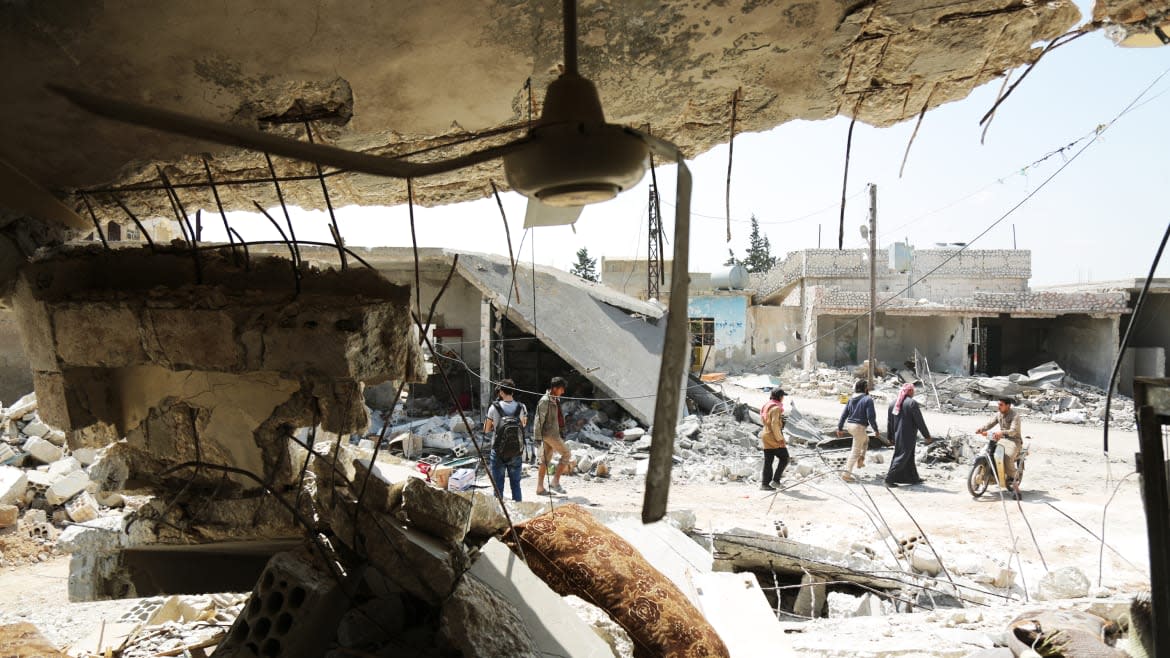Russian Air Raids Signal Bloody Escalation in Syria

The Syrian civil war had seemed to grow quieter in early 2019 as battle lines stabilized and air raids became less frequent.
Now, with Russia targeting a rebel-controlled area this week, the air war is back on. A ground assault soon could follow.
Syria has all but disappeared from the news in many countries. Perhaps for that reason it’s a low priority for the administration of President Trump.
But the fighting and the dying are getting worse as the war drags into its eighth year. Monday’s air raids are an extension of a bombing campaign that began in April and reportedly has killed more than 1,500 people.
Monitors in Syria told Reuters that Russian Sukhoi warplanes on Monday dropped bombs on Jabala and Khan Sheikhoun and other towns in Idlib province. Rescuers reported pulling at least 25 bodies from the rubble.
Despite territorial gains in recent years by a combined force of Syrian troops and Syrian- and Iranian-led militias, all backed by Russian missiles and air power, part of Hama and Idlib provinces in northwest Syria, just south of Turkey, largely remain under the control of rebel and militant groups.
As many as 3 million people live in opposition-controlled communities in Idlib and Hama. Around 270,000 of them have fled since Russian air attacks intensified in April, according to the Century Foundation, a New York City think tank.
Russia Starved People in a U.S.-Controlled Corner of Syria, and Trump Let It Happen
Since Russia’s intervention in 2015 tipped the balance of power in the region in favor of the regime of Syrian strongman Bashar al-Assad, pro-regime forces have pursued the same strategy.
Russian warplanes bomb opposition forces as well as civilians in opposition-controlled towns, softening up resistance for an eventual ground assault by Syrian forces and Iranian-backed militias.
“I think anyone who is following Syria closely realises that the battle for Idlib will be one of the final major actions of the conflict,” Eliot Higgins, a Syria expert and founder of Bellingcat, told The Daily Beast.
After heavy rebel losses and mergers and abortive attempts by the United States and its allies to train anti-regime fighters, two groups have come to dominate what remains of the Syrian opposition. Hay’et Tahrir al Sham is an affiliation of Islamic militants. Jaysh al Izza includes the survivors of the U.S.-backed Free Syrian Army.
Both groups rely on financing from Turkey and the Gulf states. Money and manpower are short. “Right now, both appear to be receiving only enough supplies and reinforcements only to maintain their front lines [and] sporadically launch counterattacks,” Tom Cooper, an author and independent military expert, told The Daily Beast.
Hospitals and clinics are among the Russians’ favorite targets. Air raids since April have damaged or destroyed around two dozen medical facilities, the Century Foundation claimed.
The Russian Defense Ministry did not respond to a request for comment.
The Kremlin’s goal, Cooper said, is to “make life for the remaining population in rebel- [or] insurgent-controlled areas impossible [and] drive that population out so as to destroy the local support for the enemy combatants and deny their legitimacy.”
Don’t expect world powers or international bodies to do anything to stop the attacks on medical facilities. “The international community has done nothing about these sort of air strikes for the past eight years of conflict,” Higgins said.
“There’s currently a lack of interest and leadership from the White House,” Higgins added. “Trump’s actions on Syria seems to be fueled by Fox News coverage and whatever world leader has recently given him the nicest compliments.”
The U.S.-led Combined Joint Task Force Operation Inherent Resolve, which oversees operations targeting ISIS militants in Syria and Iraq, told The Daily Beast the Russian air raids are none of its business. “CJTF-OIR remains focused on the enduring defeat of Daesh,” the coalition stated, using a slang term for ISIS.
Tragically, the United Nations inadvertently might have helped the Russians. Some hospitals in opposition-controlled areas voluntarily shared their GPS coordinates with the Russians as part of the United Nations’ “humanitarian deconfliction” initiative, all in the hope that Moscow would order its warplanes to steer clear.
“It doesn’t seem to be helping,” analyst Aron Lund wrote for the Century Foundation. “Some officials and activists now wonder if the ‘no-strike list’ is being used to locate and destroy hospitals—the very opposite of what the U.N. intended.”
Moscow justifies the attacks by mischaracterizing the Syrian opposition. “Moscow’s official position is Idlib and Hama became a safe haven for terrorists and need to be liberated from them,” Pavel Luzin, a professor of international relations at Russia’s Perm University, told The Daily Beast.
The scale of the Russian air war belies the Kremlin’s desperation. Russian President Vladimir Putin as far back as 2017 declared victory in Syria, underscoring his eagerness to extricate his country from the Syrian quagmire.
But Putin wants to exit the war on favorable terms for Russia, with a strong ally firmly in power in Syria and diplomatic leverage over the United States and its allies, according to Luzin.
However, the tenacity of the Syrian opposition, deepening corruption and criminality in Damascus, and Iran’s own bloodthirstiness have combined to deny Russia a clean exit. “Russia is not able to convert its achievements on the Syrian battlefield into political results, into political and diplomatic victory,” Luzin explained.
So the bombings continue. Hospitals burn. People die.
Another bloody round of fighting on the ground is likely to follow as Assad tries, with Russian and Iranian support, to wipe out an opposition that has endured for eight years.
Got a tip? Send it to The Daily Beast here
Get our top stories in your inbox every day. Sign up now!
Daily Beast Membership: Beast Inside goes deeper on the stories that matter to you. Learn more.

